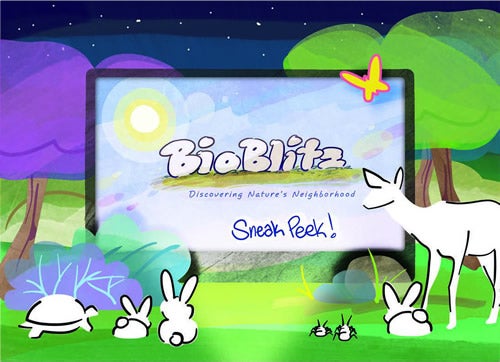David Gregg, Executive Director of the RI Natural History Survey
Rhode Island is a wonderful and special place. An abundance of breath-taking coastlines, great food ranging from five-star restaurants to ocean-side clam shacks, and world-renowned beaches.
But, when you are enjoying these unique attractions, how often to you stop to look at the plants and animals around you?
Beneath the waves and beyond the beach, Rhode Island is home to an abundance of life. From plants, algae, and fungi right up the food chain to shorebirds, fish, and mammals, and everything in between.
It is important to know what is out there. We need to monitor our natural neighborhoods so we know if new species are coming into our state, native species are disappearing, or if we may be one of the last strongholds of an endangered species.
Enter: BioBlitz.
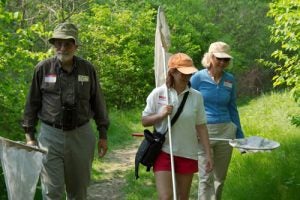
BioBlitz is a 24-hour dash by volunteers, working scientists, and avocational naturalists to tally as many species as they can on a particular parcel of land. It is designed to bring the community of naturalists together, to demonstrate the biodiversity that surrounds us on even the most mundane-looking land, and the value of these species to ever important biodiversity and its relationship to our quality of life.
Rhode Island Natural History Survey has been hosting BioBlitz at locations around the state since 2000, including a blitz at Canonchet Farm along Narragansett’s Narrow River in 2013.
The 2013 BioBlitz will be immortalized in my mind for many reasons. First, it was a torrential downpour and I was bolstered by the tenacity and dedication of the many volunteers who donned their foul-weather gear and braved the less than ideal conditions. Secondly, the Coastal Institute at URI chose this BioBlitz as the focus of its documentary BioBlitz: Discovering Nature’s Neighborhood.
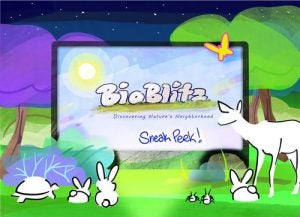 Thanks to the vision and financial support of the Coastal Institute, a First Priority Media film crew was engaged from Boston and New York City to capture every minute of the 24-hour event. They interviewed the enthusiastic volunteers. Then Coastal Institute staff, professional consultants and grad students spent over a year writing a script and editing it into an entertaining and informative 27 minute documentary that you will soon see on public access television. Watch for broadcast times.
Thanks to the vision and financial support of the Coastal Institute, a First Priority Media film crew was engaged from Boston and New York City to capture every minute of the 24-hour event. They interviewed the enthusiastic volunteers. Then Coastal Institute staff, professional consultants and grad students spent over a year writing a script and editing it into an entertaining and informative 27 minute documentary that you will soon see on public access television. Watch for broadcast times.
Like the Rhode Island Natural History Survey, the Coastal Institute is dedicated to increasing our understanding of the relationship between our communities and the environment, explaining the importance of monitoring and biodiversity, and encouraging more “free-range” activities for kids in the natural world around them. Beyond that, the Coastal Institute is committed to conveying that message in effective formats that are not as frequently accessible to scientists. The BioBlitz documentary successfully encapsulates all of these goals.
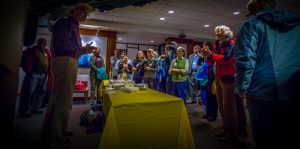
The Coastal Institute recently hosted a special sneak peek of the film for members of the Rhode Island Natural History Survey, and the overwhelming response was that the documentary was two thumbs up! Guests chuckled as they reminisced about the fun day, school-aged kids exclaimed when they caught sight of themselves on film, critters made successful cinematic debuts, and we celebrated the success of the documentary and the value of BioBlitz.
Need more proof that BioBlitz is important?
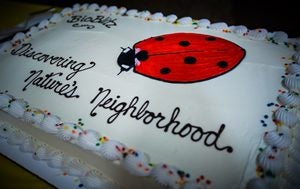
At the 2014 BioBlitz, held at Rocky Point in Warwick, volunteers found a rare nine-spotted ladybug. These ladybugs were once common in this area but haven’t been seen in over 30 years. To date, there are only two known sites that serve as this ladybug’s habitat. They are an important species and a ubiquitous and beloved character in children’s books. Working with the Lost Ladybug Project at Cornell University, ladybug enthusiasts have been on the lookout for more of these disappearing insects.
BioBlitz: Discovering Nature’s Neighborhood and finding rare insects are events that highlight the uniqueness of Rhode Island’s flora and fauna and the importance of this exciting community activity, and would not be possible without the generous support of RINHS members and volunteers, and organizations like the Coastal Institute.
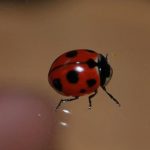
Visit the RINHS website to learn more about BioBlitz [link to http://rinhs.org/who-we-are-what-we-do/bioblitz/], including information on the 2015 BioBlitz to be held in Little Compton later this month.
If you are a budding entomologist, learn more about the nine-spotted ladybug at the RINHS website or through The Lost Ladybug Project.

